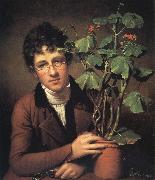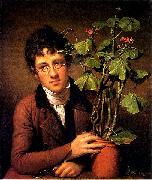Wholesale Oil Painting No Minimum |
|||||||||||
|
|
|||||||||||

|
|||||||||||
|
|
|
||||||||
Rembrandt Peale1778-1860 Rembrandt Peale Galleries Rembrandt Peale (February 22, 1778 ?C October 3, 1860) was a 19th century American artist that received critical acclaim for his portraits of presidents George Washington and Thomas Jefferson. Although modern art critics would consider Peale??s artwork as French neoclassical, its dark and stylized characteristics are similar to 15th and 16th century paintings. Rembrandt Peale was born the third of six surviving children (eleven had died) to his mother, Rachel Brewer, and father, Charles Willson Peale in Bucks County, Pennsylvania, on February 22, 1778. The father, Charles, also a notable artist, taught each child to paint scenery and portraiture, and Rembrandt was no exception. Charles tutored Rembrandt about the importance of having a strong mind from learning arts and sciences. At the age of eight, Rembrandt discovered drawing, and at thirteen, painted his first known self-portrait. Later on in his life, Rembrandt Peale "often showed this painting to young beginners, to encourage them to go from 'bad' to better..." like his steady progressions to become a successful portraitist. A year after his mother??s death and remarriage of his father, Rembrandt Peale left the school of the arts, thereby applying his time to completing his first ever self-portrait at the age of 13. The canvas illustrates early mastery of a young aspiring artist, seeming very mature. The clothes, however give the notion that Peale over-exaggerated what a 13 year old would look like. This style demonstrates early forms of neoclassicism by the looks of Peale's angel-like hair, the way it waves and curls in such a fashion so as to depict an angel from a general Renaissance artist's works of art. In July of 1787, Charles Willson Peale introduced his son Rembrandt to George Washington, where the young aspirant artist watched his father paint the remarkable figure of the country. In 1795, at the age of 17, Rembrandt painted an aging Washington, though the painter had depicted the politician as far more aged than the original facial characteristics. It did, nevertheless attain praise and Rembrandt had begun his debut. At the age of 20, Rembrandt married 22-year-old Eleanor May Short (1776-1836) at St. Joseph's Catholic Church in Philadelphia. During their marriage, Rembrandt and Eleanor had nine children: Rosalba, Eleanor, Sarah Miriam, Michael Angelo, and Emma Clara among them. In 1822, Peale moved to New York City where he embarked on an attempt to paint what he hoped would become the "standard likeness" of Washington. He studied portraits by other artists including John Trumbull, Gilbert Stuart and his own father, as well as his own 1795 picture which had never truly satisfied him. His resulting work Patriae Pater, completed in 1824, depicts Washington through an oval window, and is considered by many to be second only to Gilbert Stuart's iconic Athenaeum painting of the first president. Peale subsequently attempted to capitalize on the success of what quickly became known as his "Porthole" picture. Patriae Pater was purchased by Congress in 1832 and still hangs in the U.S. Capitol. Later on, Peale made over 70 detailed replicas of the same "father of our country", the first President of the United States. Peale continued to paint other noted portraits, such as those of the third president Thomas Jefferson while he was in office (1805), and later on a portrait of Chief Justice John Marshall. |
||||||||
|
|
||||||||
Rubens Peale with a Geranium
Rubens Peale with a Geranium Painting ID:: 31987 |
mk77
Oil on canvas
28 1/4x24in
mk77 Oil on canvas 28 1/4x24in |
|||||||
|
|
||||||||
Raphaelle Peale1774-1825 Peale was born in Philadelphia as the son and first child of Rachel and Charles Willson Peale, a famous portraitist. Lived in Philadelphia, on a home at the corner of 3rd and Lombard. Married Martha (Patty) McGlathery at the age of 20. First first professional exhibition was in 1795 at the age of 21. Artist. Born Raphaelle Peale in Annapolis, Maryland on February 17, 1774, the fifth child, though eldest surviving, of Charles Willson Peale and his first wife Rachel Brewer. As with all the Peale children, Raphael was trained by his father as an artist. Early in his career, the pair collaborated on portraits. On some commissions, Raphael painted miniatures while his brother, Rembrandt, painted full size portraits. In 1792, he made a trip to South America in order to collect specimens for the Peale's Museum. In 1797, with his brother Rembrandt, he traveled to Charleston, South Carolina, where they attempted to establish another museum. The plan fell through, however, and Raphael returned to painting miniatures. He married Martha McGlathery at about that same time, and with her had eight children. For about two years beginning in 1803, Raphael toured Virginia with the ??physiognotrace,' a profile making machine, with which he was briefly successful. In August 1808, he was hospitalized with delirium tremens, exacerbated by severe gout. By 1813, he was unable to walk without crutches. After the downturn in his health, in an era when most artists considered still life a subject worthy only of amateurs, he devoted himself almost exclusively to still life painting. It is for these works he is best known. Raphael Peale is today considered the founder of the American Still Life school. His work was on frequent exhibit at the Pennsylvania Academy of the Fine Arts between 1814 and 1818. After reportedly indulging in a night of heavy drinking, his health destroyed, Raphael died on March 3, 1825 at age 51 at his home in Philadelphia. Peale's tightly grouped still lifes are often permeated with a delicate melancholy akin to that which characterized the life of the artist; he was an alcoholic who suffered the effects of arsenic and mercury poisoning caused by his work as a taxidermist in his father's museum. His spare, essential style may have been influenced by the Spanish still lifes he studied in Mexico and by the works of Juan Sanchez Cotan, exhibited at the Pennsylvania Academy in 1818. |
||||||||
|
|
||||||||
|
|
Rubens Peale with a Geranium
Rubens Peale with a Geranium Painting ID:: 80539 |
English: 1801
Medium Oil on canvas
Dimensions English: 28 1/4 x 24" (71.7 x 61 cm)
cyf English: 1801 Medium Oil on canvas Dimensions English: 28 1/4 x 24" (71.7 x 61 cm) cyf |
||||||
|
|
||||||||
|
Raphaelle Peale 1774-1825 Peale was born in Philadelphia as the son and first child of Rachel and Charles Willson Peale, a famous portraitist. Lived in Philadelphia, on a home at the corner of 3rd and Lombard. Married Martha (Patty) McGlathery at the age of 20. First first professional exhibition was in 1795 at the age of 21. Artist. Born Raphaelle Peale in Annapolis, Maryland on February 17, 1774, the fifth child, though eldest surviving, of Charles Willson Peale and his first wife Rachel Brewer. As with all the Peale children, Raphael was trained by his father as an artist. Early in his career, the pair collaborated on portraits. On some commissions, Raphael painted miniatures while his brother, Rembrandt, painted full size portraits. In 1792, he made a trip to South America in order to collect specimens for the Peale's Museum. In 1797, with his brother Rembrandt, he traveled to Charleston, South Carolina, where they attempted to establish another museum. The plan fell through, however, and Raphael returned to painting miniatures. He married Martha McGlathery at about that same time, and with her had eight children. For about two years beginning in 1803, Raphael toured Virginia with the ??physiognotrace,' a profile making machine, with which he was briefly successful. In August 1808, he was hospitalized with delirium tremens, exacerbated by severe gout. By 1813, he was unable to walk without crutches. After the downturn in his health, in an era when most artists considered still life a subject worthy only of amateurs, he devoted himself almost exclusively to still life painting. It is for these works he is best known. Raphael Peale is today considered the founder of the American Still Life school. His work was on frequent exhibit at the Pennsylvania Academy of the Fine Arts between 1814 and 1818. After reportedly indulging in a night of heavy drinking, his health destroyed, Raphael died on March 3, 1825 at age 51 at his home in Philadelphia. Peale's tightly grouped still lifes are often permeated with a delicate melancholy akin to that which characterized the life of the artist; he was an alcoholic who suffered the effects of arsenic and mercury poisoning caused by his work as a taxidermist in his father's museum. His spare, essential style may have been influenced by the Spanish still lifes he studied in Mexico and by the works of Juan Sanchez Cotan, exhibited at the Pennsylvania Academy in 1818. Rubens Peale with a Geranium English: 1801 Medium Oil on canvas Dimensions English: 28 1/4 x 24" (71.7 x 61 cm) cyf |
||||||||
|
|
||||||||
|
Prev Next
|
||||||||
|
|
||||||||
|
Related Paintings to Raphaelle Peale :. |
||||||||
|
|
||||||||
|
CONTACT US |


